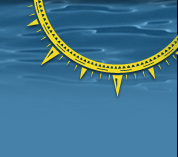
 |

VesselsDescriptionHistory of the Educational Fleet Employment Opportunities
|
History of the RiverQuest Education Fleet
1991Pittsburgh Voyager, Inc. is incorporated. The agency will later do business under the name RiverQuest, starting in 2006.
1993The U.S. Navy Community Service Program and the Federal Surplus Bureau donated two decommissioned Yard Patrol boats to RiverQuest, then known as Pittsburgh Voyager. This class of boat was designed and used to train midshipmen and junior officers in the basic arts of navigation, ship handling and seamanship. YP-667, now referred to as Voyager, was built in 1966 in Stockton, California by The Stephens Brothers. YP-657, later referred to as Discovery was built in 1958, also by the Stephens Brothers. Both boats were given "Opportunity Lifts" by U.S. Navy LSD's which moved the boats from San Diego to New Orleans. With assistance from Avondale Shipyard in New Orleans, YP-667 was transferred from the USS Harpers Ferry onto a specially made cradle placed in a barge and towed to Pittsburgh via the Mississippi and Ohio Rivers. The U.S. Army Corps of Engineers generously allowed Pittsburgh Voyager to dock YP-667 at its Neville Island facility (PEWARS) for nearly 18 months while repairs and renovations were being completed. 1996Avondale Shipyard offloaded YP-657 from USS Fort McHenry. The vessel was taken to a nearby shipyard for preliminary hull repairs, In May 1997, with support from the Pittsburgh's Naval Reserve Unit AD-41, and Pittsburgh Voyager crew, YP-657 departed under its own power to Pittsburgh via the Tombigbee Waterway and the Ohio River. 1999RiverQuest, then known as Pittsburgh Voyager, added a third vessel to its fleet. The U.S. Army Corps of Engineers and the Federal Surplus Bureau donated a 44-foot houseboat, originally known as the W. E. Merrill, to RiverQuest. Renamed Scout, this vessel is used for education programming for smaller groups and to present programs on tributaries and outside the Pittsburgh pool through 2008. 2004Efforts to create a new, custom-designed vessel to serve the education programs are underway. The new vessel is expected to double or triple the capacity of one of the YP boats. 2005The design of the new vessel shifts to embrace the tenets of green design, to become a worldwide first "green" passenger vessel. 2006Construction of the new vessel, named Explorer, is carried out at a shipyard in Freeport, Florida. Sea trials and technical adjustments are made in preparation for the upriver journey to Pittsburgh. In September, Pittsburgh Voyager officially changes its operating name to RiverQuest. 2007The vessel Voyager is retired after more than 10 years as part of the Pittsburgh Voyager and RiverQuest fleets. After corrective adjustments have been completed, Explorer is set to arrive in Pittsburgh in summer 2008. 2008The newly constructed green vessel Explorer arrives in Pittsburgh on August 13, 2008. During its first 6 weeks in town, more than 1,500 people walk through the new vessel to learn about its green features and about public and school program opportunities. In December, WorkBoat Magazine awards the new vessel its first-ever Environmental Award. Also in 2008, houseboat laboratory vessel Scout is retired from RiverQuest service. 2009Explorer completes Coast Guard inspections in March and is awarded a COI to begin full operations for students, charters and the public. The vessel Discovery is retired after nearly 12 years as part of the Pittsburgh Voyager and RiverQuest fleets. 2010RiverQuest celebrates 15 Years on the Water. School and public programs feature World Environment Day 2010 themes. School programs on Explorer serve a record number, nearly 5000 students in one year. 2011-12 RiverQuest serves a record number of more than 8,100 students in programs onboard EXPLORER in one year. 2013 RiverQuest EXPLORER undergoes 5-year US Coast Guart drydock inspection and repairs at CTC in Dunlevy, PA. 2014-15Potential next-generation hybrid propulsion systems are considered for future use on Explorer as RiverQuest programs reach the 20-year mark. |